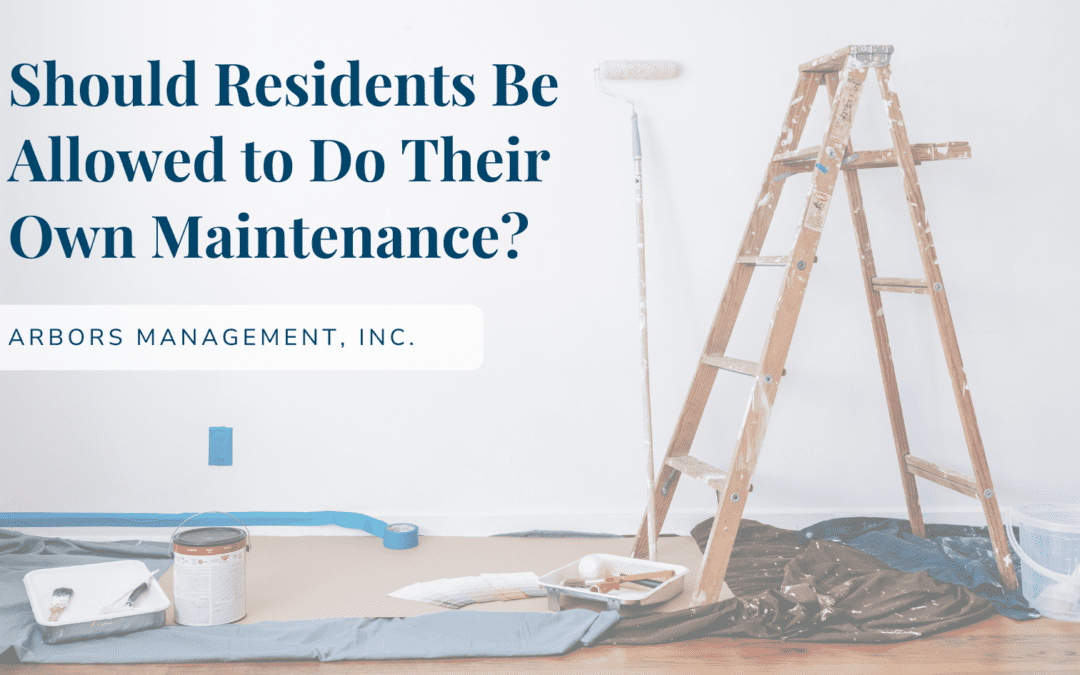
by Nicole Fandel | Nov 8, 2023 | Uncategorized
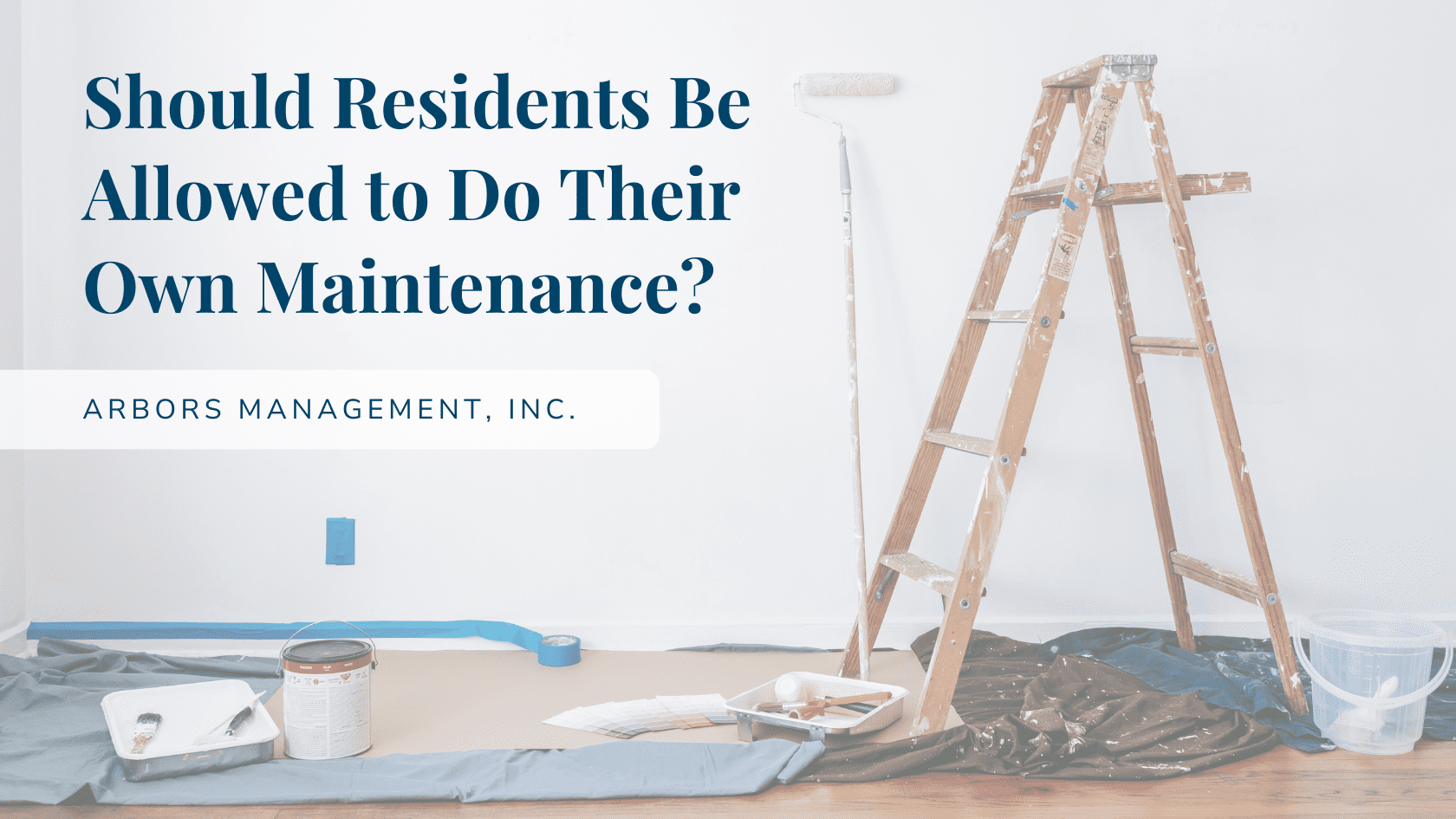
Should Residents Be Allowed to Do Their Own Maintenance?
As an investment property owner, you’ve probably had at least a minor maintenance issue or two at your property.
And once your resident notified you of this minor issue, chances are that you were met with the statement:
“I don’t want to wait for a vendor to come out. Can’t I just repair this myself?”
Well, that depends.
Essentially, the blanket answer is no, but there are exceptions to every rule.
Professional Maintenance of Your Property
When it comes to the maintenance of your property, you want to ensure that you’re utilizing skilled professionals that know what they’re doing.
If you allow your resident to perform repairs at the property, a couple of less-than-desirable outcomes could occur:
- They don’t do the repair correctly, causing you additional maintenance and additional expense
- The resident can damage your property if repairs are done improperly
- The resident gets hurt while performing maintenance, which causes a liability to you as an owner
But when using a professional, you have the peace of mind that they can perform skilled work because they’ve been trained in it.
The cost is a little higher up front, but will ultimately save you money in the long run.
Licensed & Insured Vendors
An important item to note is that you want to ensure that the vendors you work with have appropriate insurance and licensing in their field.
If the vendor you hire does something wrong, damages property, gets hurt, etc. their insurance will cover it.
With hiring properly licensed & insured vendors, your liability is greatly reduced in a number of ways.
Examples of Maintenance that Residents Should NOT Do:
- Any major mechanical repairs involving:
- Plumbing
- HVAC
- Appliance
- Electrical
- Roof repairs
- Flooring/carpet installation
- Siding or window repairs
- Gutter clean out
- Lawn maintenance and snow removal when there are multiple units at a property
This isn’t an exhaustive list of everything that residents shouldn’t do maintenance-wise.
However, it does serve as a brief summary of some of the most important items that you don’t want to risk a resident handling themselves.
Examples of Maintenance that Residents Can/Should Do:
- Small routine maintenance that would be expected when living in a home
- Change out a furnace filter
- Water filter
- Changing light bulbs
- Lawn maintenance for a single-family home
- Cutting grass, trimming trees, shrubs, etc.
- Snow removal for a single-family home
At times, an item may need to be purchased to aid in small routine maintenance, like a dehumidifier or space heater.
You can allow the resident to purchase the item, provide you a receipt, and you can reimburse them if there is a need for that specific item (that doesn’t require professional installation).
Any good lease (like ours) covers these topics and puts the responsibility on the resident for these routine service items.
Overall…
It’s in your best interest to hire professionals to handle most major maintenance items/repairs at your property.
Professionals are best when considering liability concerns, properly done maintenance, and long-term care of your property.
After all, your property is a big asset that you want to protect.
But, with that being said, there are always a few minor things that the resident should be responsible for outlined above.
The list does not include anything major, but just what would be regularly expected of someone occupying a home.
If you’d like to discuss any of this, please contact us about your specific situation. We’d be happy to walk through your situation and property needs with you!
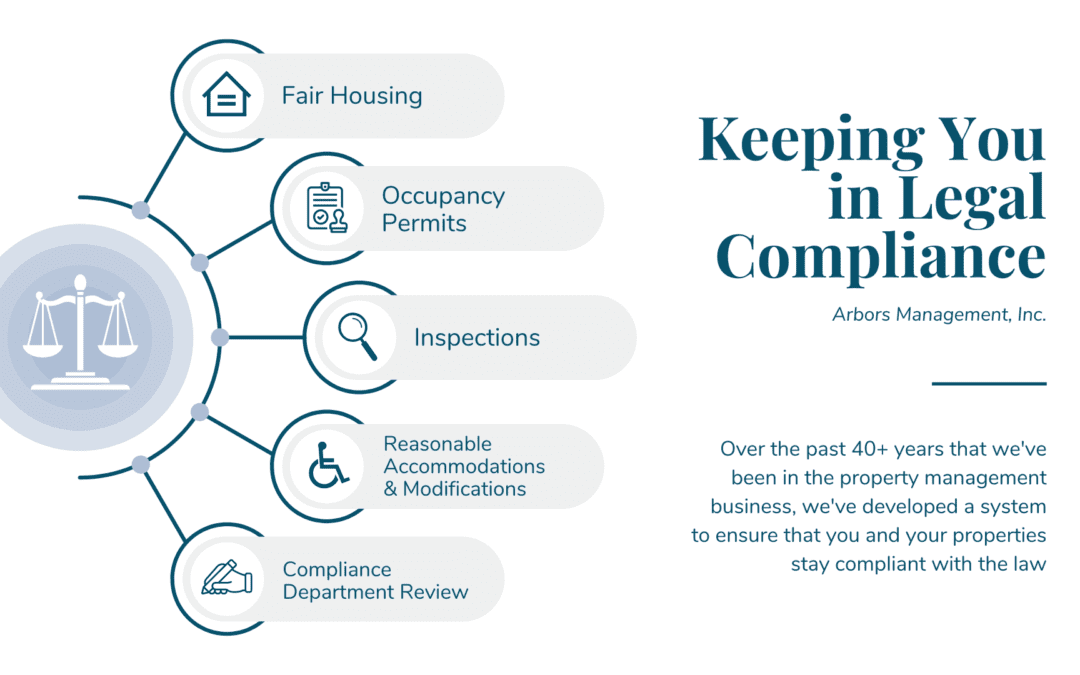
by Nicole Fandel | Dec 5, 2022 | Blog, Property Management Education, Tenant Education
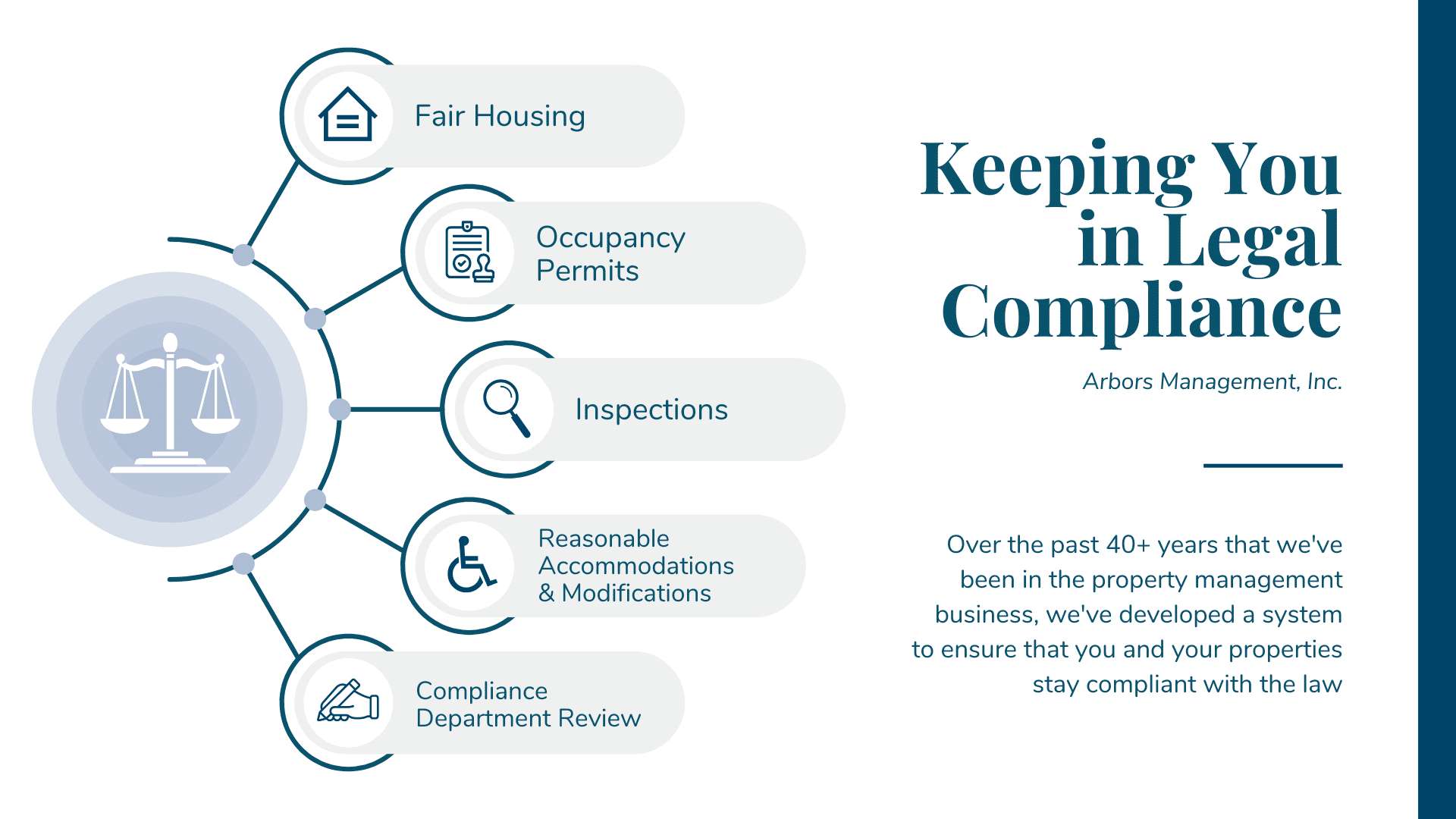
By: Nick Griffith & Nicole Fandel, Director of Conventional Housing and Marketing Specialist
How We Keep Our Clients in Compliance with the Law
One of the most important facets of property management is maintaining legal compliance. As daunting as that can be for one owner, Arbors has a dedicated Compliance Department to ensure that you and your property are in the clear.
So how do we keep our clients legally compliant? We’ll break that down in this article over these five different categories:
- Fair Housing
- Occupancy Permits
- Inspections
- Reasonable Accommodations and Reasonable Modifications
- Compliance Department Review
1. Fair Housing
First and foremost, we want to make sure your property is compliant with fair housing regulations, one of the most important aspects of managing rental properties. How do we keep you in compliance with fair housing law?
One of the best ways for us to do this is through our screening criteria. We’ve developed our screening criteria over the 40 years that we’ve been in business and abide by that criteria on properties that we manage in order to avoid any fair housing violations.
In an effort to eliminate unfair advantage or preference among applicants, we process applications by the standards set by the Pennsylvania State Law. We also process applications in the order that they are received.
Additionally, our agents representing you have their real estate salesperson license. With this comes continuing education to ensure we stay up to date with all legal requirements and updates pertaining to keeping you compliant with local, state, and federal laws.
2. Occupancy Permits
Another way that we keep you in compliance is by keeping your property in rental housing code compliance with any state, local, or municipality housing standards. One of the items that is included in many of these local requirements is an occupancy permit or a rental registration.
If you do have a rental property under our management, we will take care of occupancy permits or rental registrations required by any local municipality or governments. This includes:
- Payment on our clients’ behalf of rental registration fees
- Coordinating and potentially attending occupancy inspections
- Arranging any repairs needed in order to stay compliant with local municipality occupancy standards
3. Inspections
We perform annual inspections – we call them interim inspections. At these inspections, we’re looking for common things at your property that are required by the local municipalities to make sure that you’re able to obtain occupancy permits. The most common things are:
- Smoke detectors
- Carbon monoxide detectors
- Handrails
- Any other obvious safety deficiencies at the property
If we do find that any of these items need attention, we will address them.
4. Reasonable Accommodations and Modifications
Occasionally, a resident may request for a reasonable accommodation or a reasonable modification to your property.
We are trained and well-versed in the requirements necessary in order to approve or deny these requests.
We will handle the proper paperwork and forms to document the request to complete everything, all while making sure – you guessed it – that you are staying in compliance by abiding by fair housing laws when accommodating or denying a request.
Here’s the difference between the two:
Reasonable Accommodation: request for a change in our policies and procedures to accommodate a resident for a need that they have.
*Responsibility of the landlord to pay
Ex: Allowing a service animal to occupy a property with a no-pet policy
Reasonable Modification: request to change the physical nature of the property to accommodate a resident for a need that they have.
*Responsibility of the resident to pay
Ex: Installing a ramp to the front entrance of a property because the resident is wheelchair bound
5. Compliance Department Review
Any new residents moving into your property will be reviewed by our Compliance Department in order to ensure that we met all of the screening criteria appropriately.
A few items that the Compliance Department review are:
- The lease
- Application
- Credit and criminal reports
- Photo identification
- Proof of income
If they do find any errors or discrepancies, our management staff will be alerted and those will be corrected as soon as possible.
Arbors Management Keeps You Compliant
With over 40 years of experience in property management in Pittsburgh, Western Pennsylvania, and West Virginia, we’ve learned a thing or two about legal compliance.
When you hire Arbors Management to manage your property, you are also hiring a dedicated Compliance Department that ensures that you and your property are operating within the bounds of the law.
If you have any questions about our professional Pittsburgh property management services, including how our Compliance Department works, please contact us through this form, or give us a call at 1 (800) 963-1280.
Disclaimer: We are not attorneys and the information herein is not intended to be legal advice. Please consult with your attorney for any matters pertaining to your specific situation.
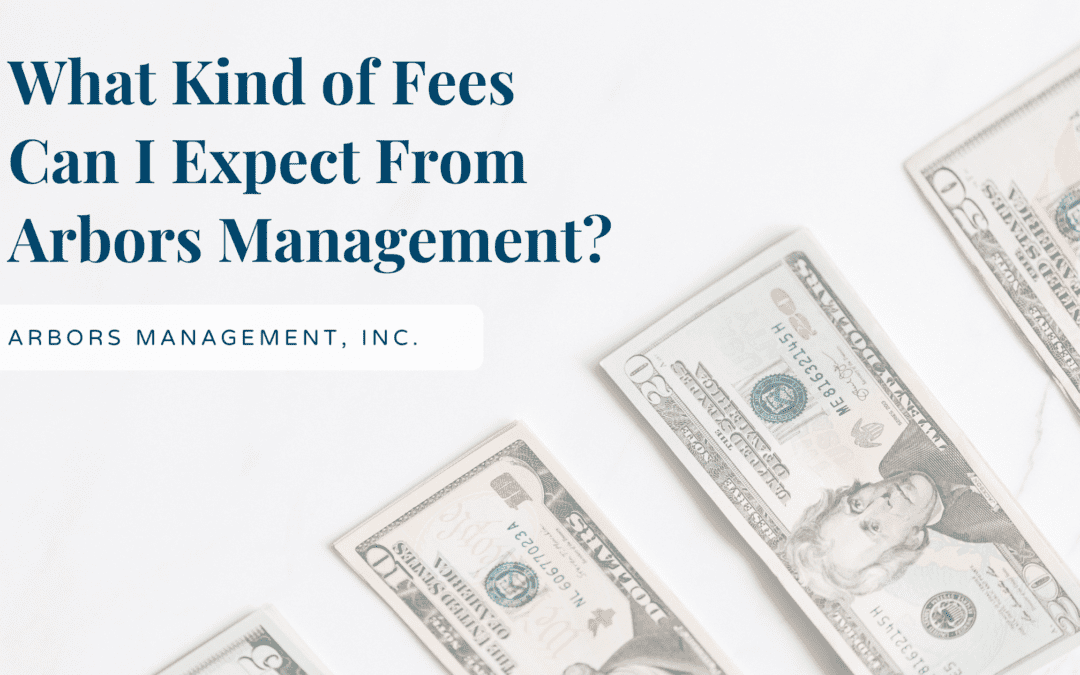
by Nicole Fandel | Apr 15, 2022 | Blog, Property Management Education, Rent Collection, Rental Price
What Kind of Fees Can I Expect From Arbors Management?
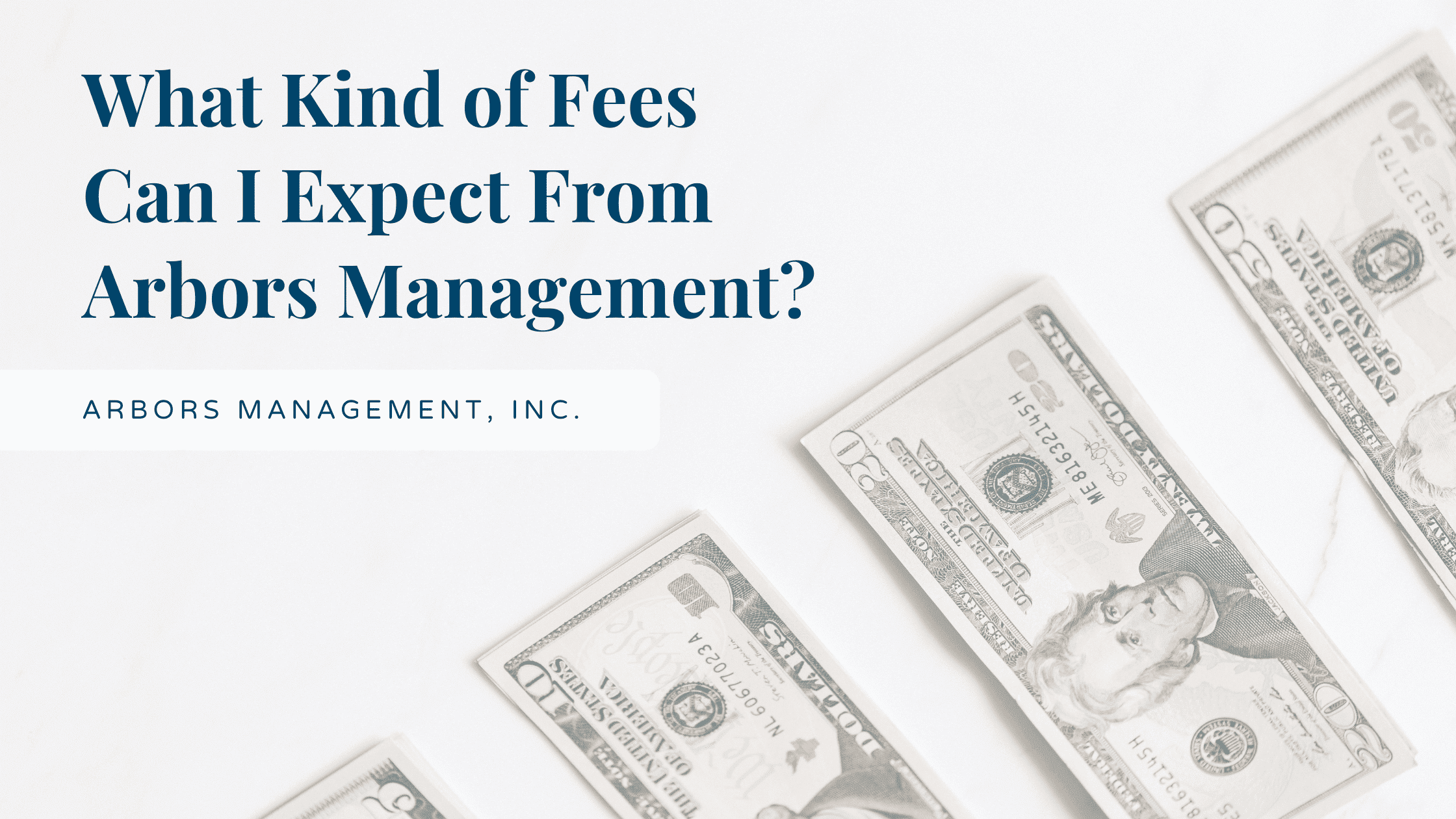
Every property management company has a different way of working and a different way of charging management fees.
For example, you might hire a management company that charges one flat rate, or you might find a property manager who charges separately for every service that’s performed.
At Arbors Management, we have three all-inclusive fees. We do not like to piecemeal our costs, and we don’t have an upcharge on our maintenance services.
Today, we’re talking about our three fees upfront and what all you can expect when you work with us.
These fees are also similar to many of the fee structures you’ll find with property management companies in and around Pittsburgh.
Leasing Fees in Pittsburgh
Our leasing fee is the equivalent of one month’s rent, meaning the first month of rent that we collect for you will pay for our leasing services. It’s a one-time fee that’s paid at the beginning of the lease.
This fee covers everything involved in finding and placing a great resident, including:
- Marketing your property
- Showing your property
- Rent pricing
- Preparing the property for rent
We’ll also handle the application process and screen each resident thoroughly and in compliance with the fair housing laws.
Once we’ve approved a resident, we’ll take care of:
- Collecting the move-in funds
- Conducting a move-in inspection of the property to document its condition
- Executing the lease agreement
Management Fees in Pittsburgh
Then, you’ll have the monthly management fee, which is typically 9 percent of your monthly rent.
The management fee can differ depending on a few different factors:
- How many units the property has
- If we will need to employ onsite staff
- How many total properties we’re managing for you
- How much those homes are earning
- The neighborhoods in which those homes are located
Your management fee will come directly out of the rent we collect from the residents. It includes everything that’s covered in our management services, from lease enforcement to inspections to maintenance.
The management fee also covers:
- Our resident and vendor communication
- Any notices that need to be served
- Our accounting and bookkeeping
- The portals we provide for residents and owners
Lease Renewal Fees in Pittsburgh
Our final fee is a renewal fee, which is a flat $250 charge that you’ll pay each time we renew a resident.
When you think about the cost of resident turnover and vacancies, it’s easy to see what a value $250 is.
We’ll work hard to retain your residents, and the renewal fee will cover our negotiation and signing of the new lease. It costs you a lot less than it would if you were paying a new leasing fee.
In Conclusion…
There is no single right way to charge management fees, but the most important thing is that the company you’re working with is transparent and honest.
The last thing you need as an owner and investor is to be surprised by extra charges, and it’s important to review your management agreement before you sign it.
Contact us at Arbors Management if you’d like to know more about our services and their costs. Our Portfolio Managers and Leasing Specialists would be happy to provide a personalized quote that’s based on your property and its unique needs!
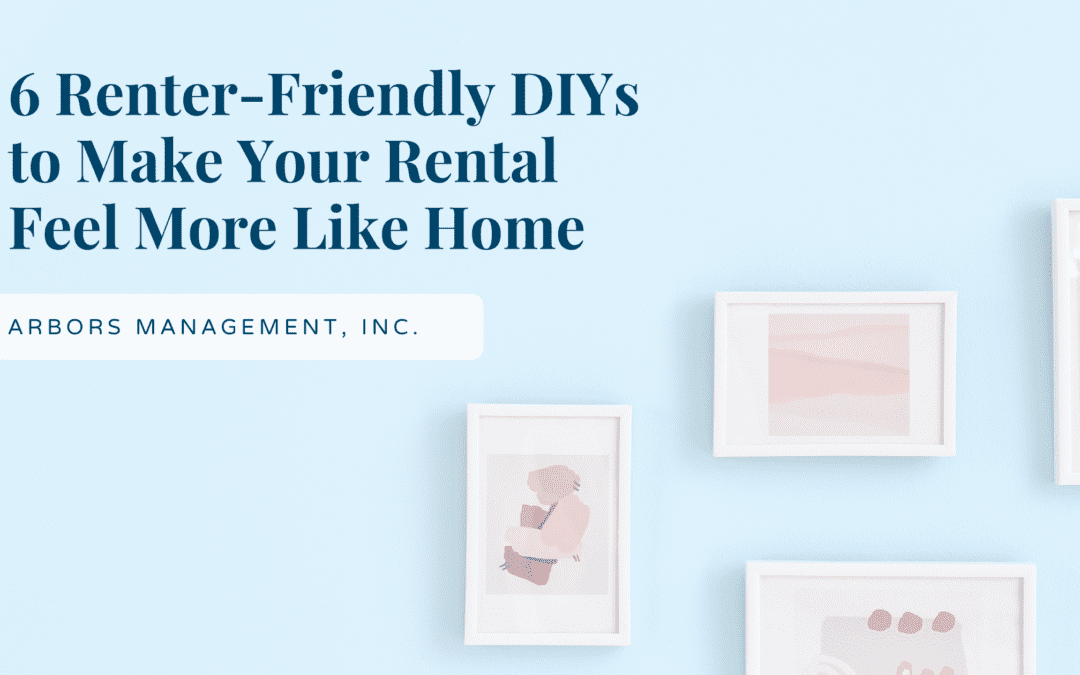
by Nicole Fandel | Mar 15, 2022 | Blog, Tenant Education
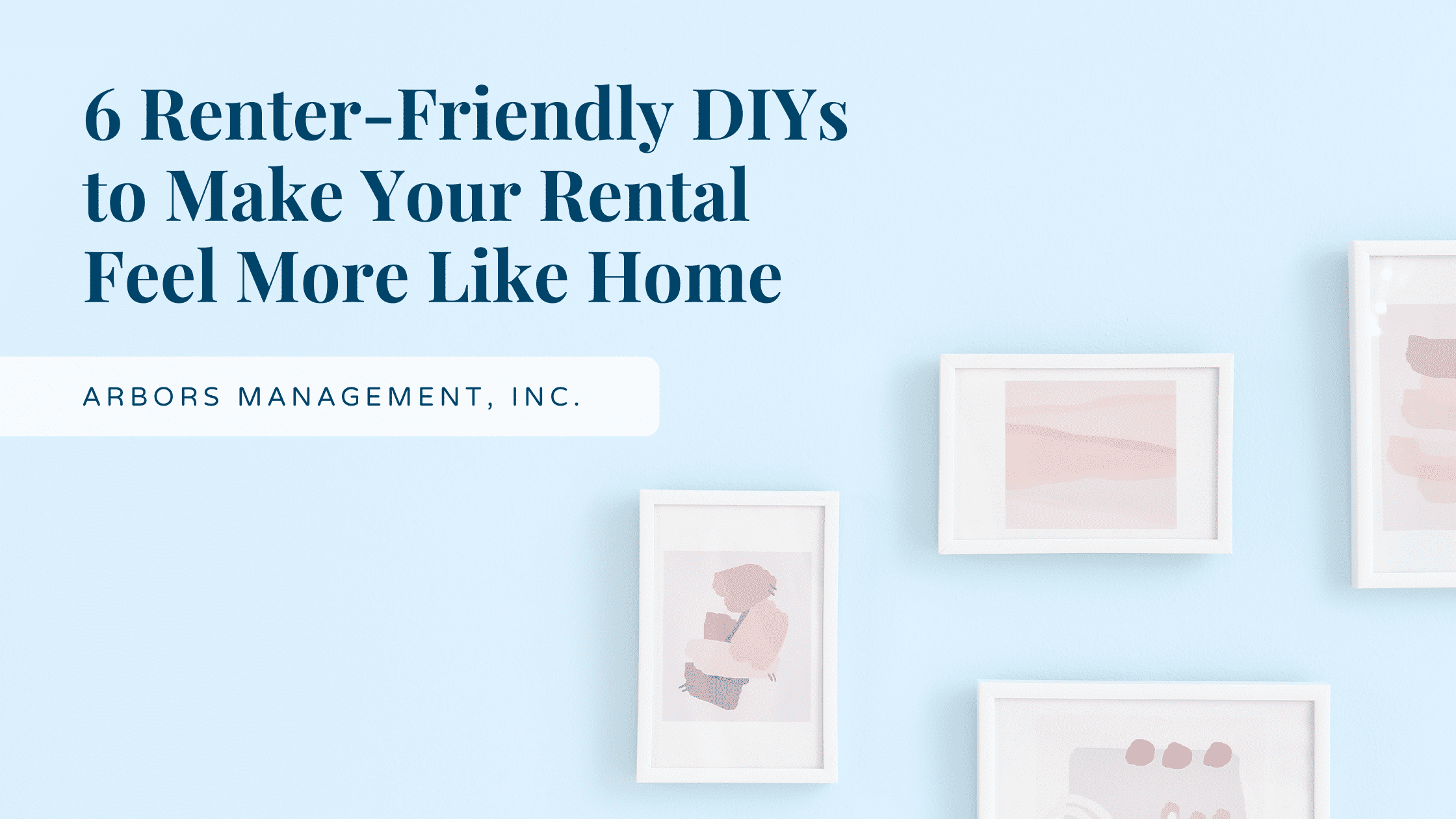
By: Nicole Fandel, Marketing Specialist at Arbors Management
6 Renter Friendly DIY Projects to Make Your Rental Feel More Like Home
There are a lot of perks to renting: you don’t have to worry about home maintenance, you have more flexibility with moving, you’re not tied down by home ownership, etc.
But there are also some downsides to renting – one of them being the feeling that you can’t properly personalize the space or make it your own.
However, there are ways around this! There are renter friendly DIYs that are temporary, cost-effective, and won’t violate the terms of your lease or upset your landlord.
Here are 6 DIY projects that you can do as a resident to make your rental feel more like home:
1. Peel and Stick Backsplash Tile 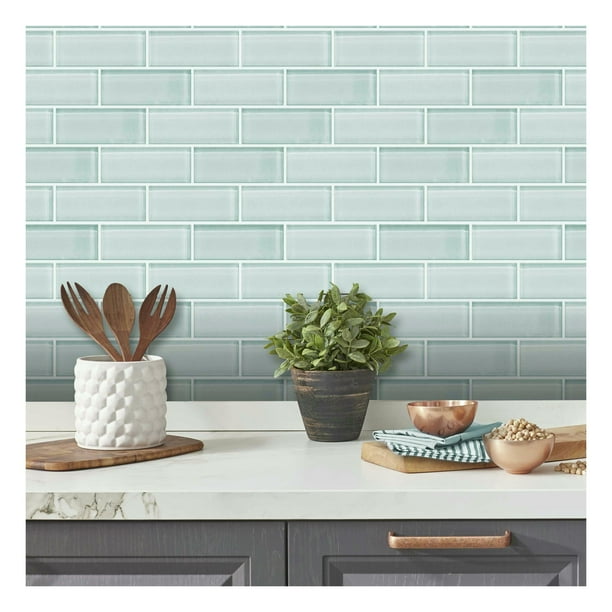
Does your kitchen need a facelift? Something that is often overlooked but makes a world of a difference is backsplash.
Sounds permanent though, right? Well, it doesn’t have to be.
Yes, there is such a thing as temporary backsplash, and it can take a rental kitchen to the next level. All you have to do is select your tile, peel, stick, and you’re done!
Take a look at this tutorial to get an idea of what materials you need and how the finished product will look. Trust me, you won’t be sorry you did this project.
2. Make a Gallery Wall 
Did you know that thousands of famous paintings are considered to be public domain, meaning that you can download high quality files of them for free online?
That’s right, you can find a ton of famous artwork online on websites like this and this and download it all for free, no strings attached. Find a high quality print service in your area, print the artwork at your dimensions of choice, frame, and hang!
To make things even more personal, why not add some of your own pictures into the mix? Pictures of friends, family, pets, anything that makes home feel like home.
3. DIY Artwork 
Use an old piece of artwork you have or spend an afternoon at your local thrift shop browsing the aisles and see if you can find a cheap canvas that could use a new look. I’ll admit, this project may take a little more creativity than some of the others, but hey – minimalism is definitely in, so you don’t have to go too crazy!
Personally, using spackle and creating a textured piece is one of my favorite techniques to repurpose a canvas that I’ve seen lately. It’s a little messy, but the end result is totally worth it.
4. Revive Old Furniture with Contact Paper 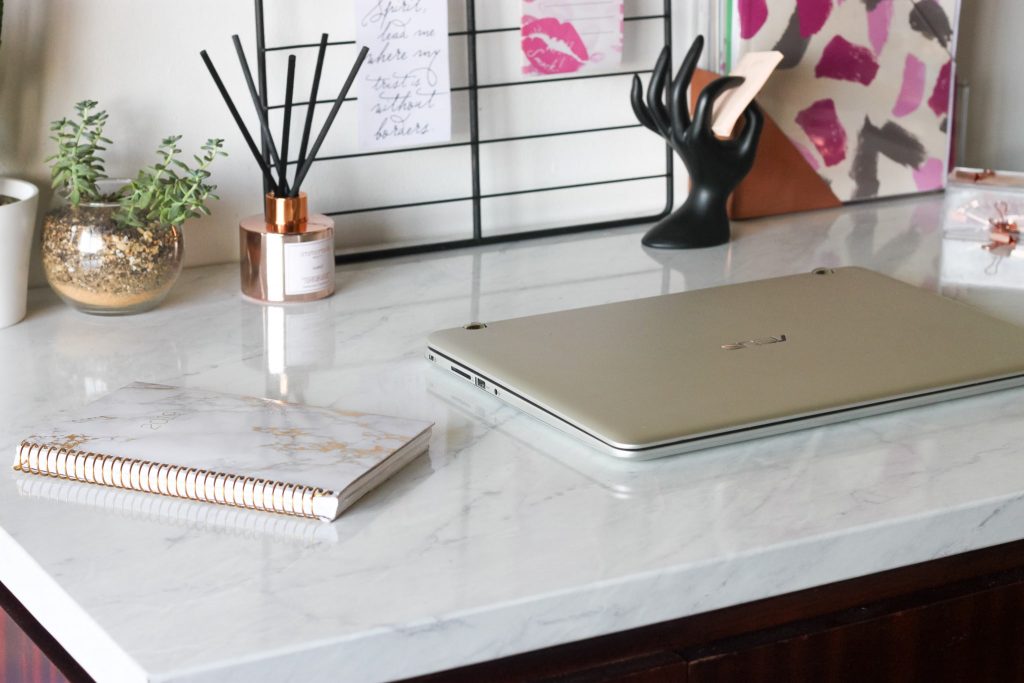
If you’ve been using the same end tables or desks for a number of years now, it’s probably safe to say that they could use a little freshening up.
If you’re not familiar, contact paper is an adhesive, decorative paper that can be applied to a variety of surfaces and comes in an array of different patterns – granite, wood, marble, and more – there are a ton of high quality designs to choose from!
For just a little bit of money and a little bit of time, the results are more than satisfying – take a look at this blog post to learn more about resurfacing with contact paper.
5. Refresh Floors with Peel and Stick Tile 
As we all know, everyone has different tastes and design preferences, even when it comes to things like flooring. Trends and styles come and go, but changing up something like flooring isn’t always that simple – but now, it can be!
Peel and stick tiles are a great way to bring new life to an outdated floor without ruining what’s underneath – a.k.a., a great temporary fix for renters looking for a change.
If you’re looking for some inspiration on what to do, check out this article on how one man changed the entire style of his kitchen with a few hours and some peel and stick floor tiles.
6. Create an Accent Wall with Peel and Stick Wallpaper 
In order to keep things simple and appeal to a range of people, most rental houses/apartments stick with a very basic color scheme on the walls, oftentimes plain white or a very light neutral shade.
Because of this, it can feel like your space lacks character or individuality. However, there is a solution that doesn’t involve a paint can and an upset landlord: peel and stick wallpaper.
Peel and stick wallpaper is available in a ton of different colors and patterns, like regular wallpaper, and can completely change the feeling of a room. With a statement wall like this, both you and your guests will be more than impressed with how personalized your rental home can be.
All in All…
When it comes to personalizing a rental home or an apartment, people often feel stuck, limited, or like they are unable to really make a space feel like home without making major, expensive, permanent changes. But as you read above, that certainly is not the case!
As we discussed above, you can personalize you home as a renter in a variety of different ways:
- Peel and stick backsplash tile
- Creating a gallery wall with prints of artwork and personal pictures
- Creating your own artwork on thrifted canvases
- Using contact paper to liven up old furniture
- Cover up old flooring with peel and stick tiles
- Making an accent wall with peel and stick wallpaper
Even though these changes are temporary, it’s still a good idea to check your lease agreement and with your landlord to ensure that any modifications you make are acceptable. All of these changes are able to be reversed or removed, so make sure you leave your rental the way that you found it once you move out!
All of these projects can be done within a day or two with basic tools and actually are very cost-effective options. So, if you’re looking for fun, inexpensive ways to liven up your rental – you came to the right article. Happy DIY-ing!
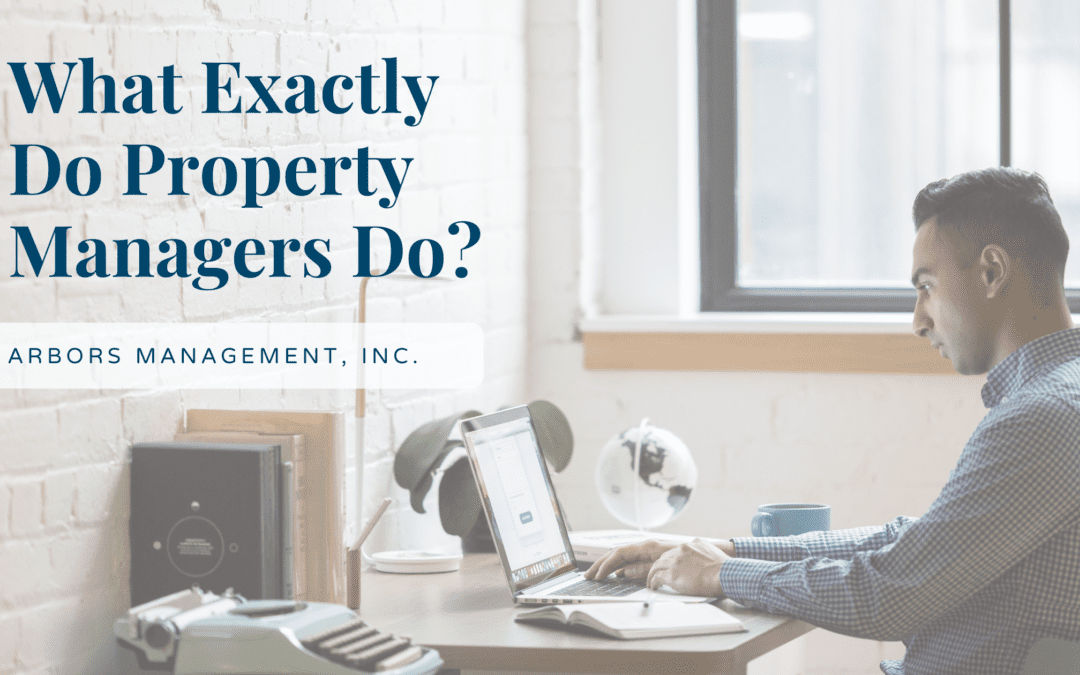
by Nicole Fandel | Mar 1, 2022 | Blog, Property Management Education
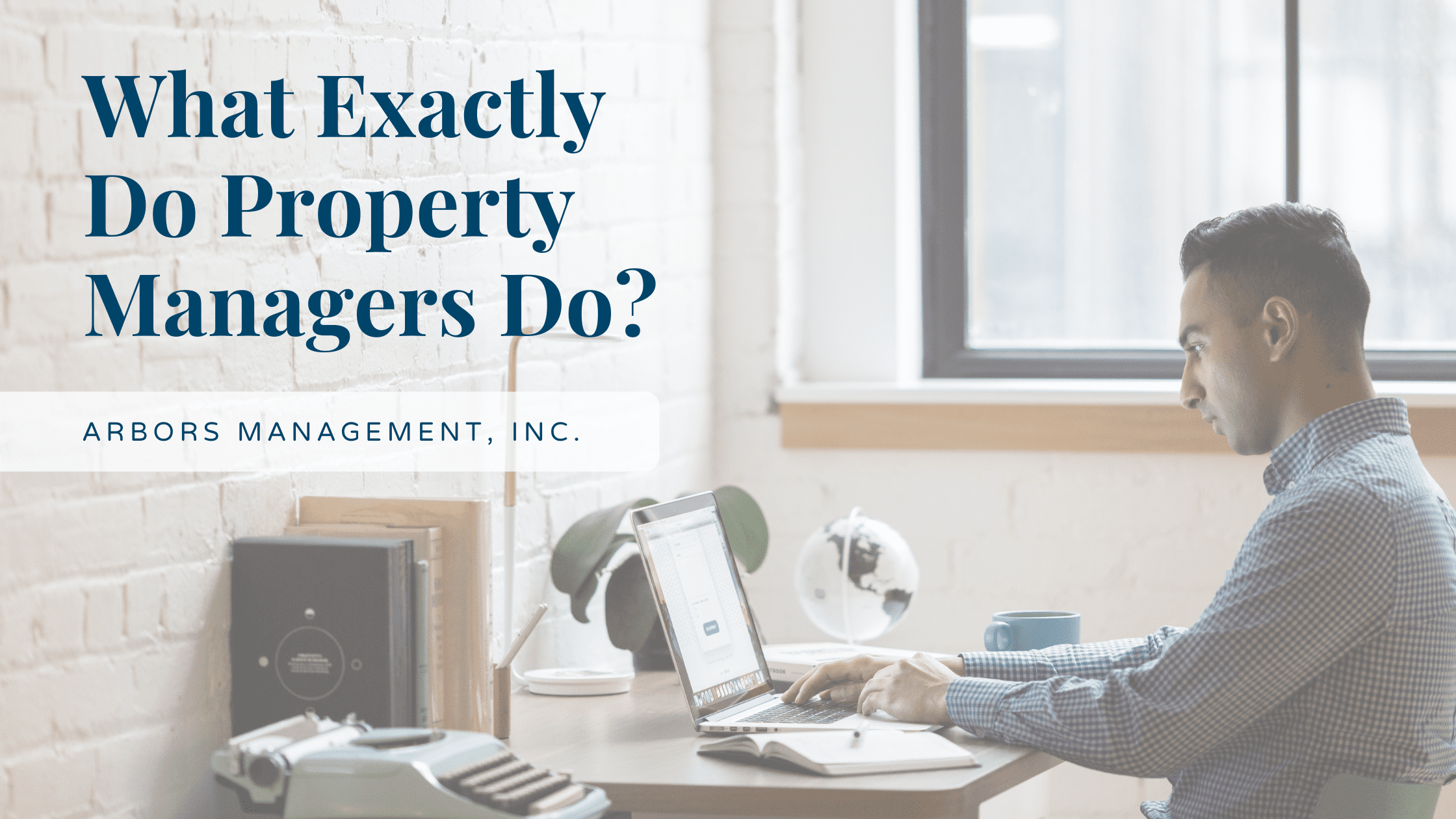
By: Nick Griffith, Director of Conventional Housing at Arbors Management
What Exactly Do Property Managers Do?
Today, we’ll be speaking about a very simple question that has a complex answer: What exactly do property managers do? The way we see it here at Arbors Management is that property management can be broken down into two main categories – leasing and day-to-day management, and two sub-categories – accounting and compliance.
But, just as important as what property managers do, is what we don’t do; we’ll cover that, too.
How Do We Handle Leasing?
An important part of property management is getting your property leased to a quality renter. Here at Arbors, we believe that most problems in real estate investing can be solved by placing the right, high-quality resident into each property. We perform several types of screening in order to accomplish this; criminal, credit, income, landlord, sex-offender, terrorist, and pet screening, just to name a few.
In order for us to attract the best quality residents, we need to properly market your property by highlighting its features as well as pricing it appropriately.
A good property manager will look at the surrounding market and comparables to determine the best price to rent the property quickly while also giving the owner the best return on their money. We also handle all the inquiries and showings of the property, saving you a lot of time and money.
Once the property manager has found a qualified applicant, they should have a rock-solid lease to ensure that the owner is protected. Here at Arbors, we have a completely online lease signing process, making renting from us easy and efficient.
Once the lease is signed, deposits are paid, and move-in is scheduled, a good property manager will perform a move-in inspection to record the condition of the property at the time the resident moves in. We record the inspection with photos that we can reference again later when the resident decides to move out.
Speaking of inspections, routine inspections are important to ensure your property is well maintained. At Arbors, our leasing specialists perform an interim inspection several months prior to the lease expiration to ensure we know the condition of the property prior to renewing the lease. We share that inspection with our clients along with our recommendations so they can make the best decision for them.
Day-to-Day Property Management – What Does it Look Like?
After the property has been leased and the resident has moved in, we turn to our second category of property management: the day-to-day management.
Perhaps one of the most important items a property manager can do is collect the rent. After all, rent is what allows you to maintain the property and make a profit!
At Arbors Management, we provide several ways for residents to pay their rent; through a convenient online portal, by mail, by drop box at our main office, or by electronic cash payment at several convenient-store locations.
Money management is also a very important part of property management. A property manager will need to pay the expenses on your property, oftentimes from the rent that is collected and bill the residents for any appropriate expenses for your reimbursement.
Once all the expenses are paid, the property manager should have a way to get the investor their money. Here at Arbors, we do a direct deposit into your bank account at the end of each month.
Another aspect of property management is working directly with residents. On occasion, residents will have maintenance requests, emergencies, and general questions or problems while living at the property. These could range from leaky plumbing, heating issues, loss of employment, income changes, additions to their family, or neighbor disputes.
A property manager communicates directly with residents to solve these issues so that you don’t have to. Enforcing a lease can be difficult, so it’s the property managers job to walk the line between being compassionate while also enforcing the agreement. A good property manager should bring you solutions, not problems.
Addressing maintenance issues is another important part of property managers’ duty to maintain the value of your asset. Emergencies can happen at any time, day or night, and even on the weekends.
This is why a good property manager needs to have a plan on what to do when an emergency does happen. Here at Arbors we have a 24/7 dedicated phone number for maintenance emergencies and a network of contractors that can respond quickly in order to resolve any issue that might arise.
How Do Accounting and Compliance Come Into Play?
Two other categories of property management are accounting and compliance.
As an investor, you’ll want to see where your money is being spent and when rents are collected by your property manager. At Arbors, we have a full accounting staff that generates reports so that you can easily see the income for your property, expenses, and any invoices or bills associated with those expenses.
Transparency is important, but so is legal compliance! When renting out a property, there are a lot of laws, rules, and regulations that come with it. Your property manager should know the ins and outs of what is needed at the property to ensure you stay in compliance with these requirements to keep you protected. At Arbors, we have a compliance department that makes sure we cross our t’s and dot our i’s to make sure everyone is protected.
So What Don’t We Do as a Property Management Company?
Almost as important as what property managers do, is what we don’t do. From the information above, we can safely say property managers wear many different hats.
Even though we have many different roles, we are not tax professionals, attorneys, or debt collectors. Oftentimes a property manager can recommend a specialist in each of these areas. We may know a thing or two about each of these topics, but your property manager shouldn’t get involved in areas outside their expertise.
All in All…
The answer to the question “what exactly do property managers do?” is complicated. We discussed how a property manager should handle leasing, day-to-day management, and all aspects involved in those two main categories.
We also discussed that property managers should be transparent with your money through good accounting reports and remain compliant by staying up to date with rental property requirements.
While property managers wear many hats, as they should, they are not tax professionals, attorneys, or debt collectors.
Hopefully you now have a better idea of everything that property management encompasses.
If you have any questions about property management and how Arbors Management might help you with your property(ies), please don’t hesitate to reach out to us!
Phone: 1(800)-963-1280
Email: monroeville@arbors.com
















